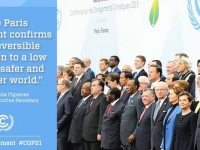Technology
GOVERNMENTS SET COURSE FOR AMBITIOUS ACTIONS AT COP21 ON CLIMATE CHANGE BUT MORE
IMMEDIATE STEPS ARE NEEDED SAID WWF

WWF Logo (Source: Courtesy of WWF)
USPA NEWS -
World governments finalised a global agreement on the now historic December 12, 2015 in Paris that lays a foundation for long-term efforts to fight climate change. More effort is needed to secure a path that would limit warming to 1.5C, according to WWF.
World governments finalised a global agreement on the now historic December 12, 2015 in Paris that lays a foundation for long-term efforts to fight climate change. More effort is needed to secure a path that would limit warming to 1.5C, according to WWF.--------------------------------------------------------------------------------------------------------------------------------------------
AN AMBITIOUS PLAN UPON THE COP21 AGREEMENT EMERGED FROM AFRICA TO DEVELOP RENEWABLE ENERGY SOURCES BY 2020----------------------------------------------------------------------------------------------------------------
This new agreement should be continuously strengthened and governments will need to go back home and deliver actions at all levels to close the emissions gap, resource the energy transition and protect the most vulnerable. The Paris talks also created a moment that produced announcements and commitments from governments, cities and business that signalled that the world is ready for a clean-energy transition.ҬҬGovernments arrived in Paris on a wave of momentum with more than 180 countries bringing national pledges on climate action. This progress was bolstered by impassioned speeches from more than 150 heads of state and governments and unprecedented mobilisations around the world that included hundreds of thousands of citizens demanding action on climate change. After two weeks of negotiations, governments reached an agreement that represents some progress in the long-term. This must urgently be strengthened and complemented with accelerated action in the near-term if we are to have any hope of meeting the ultimate goal of limiting global warming well below 2C or 1.5C. Additionally, the finance for adaptation, loss and damage and scaled up emission reductions should be the first order of work after Paris.
While the Paris agreement would go into effect in 2020, science tells us that in order to meet the global goal of limiting warming to 1.5C or well below 2C, emissions must peak before 2020 and sharply decline thereafter. The current pledges will provide about half of what is needed, leaving a 12 to 16 gigatonne emissions gap.-----------------------------------------------------
TANSEEM ESSOP, HEAD OF WWWF´S GLOBAL DELEGATION TO THE UN TALKS :---------------------------------------
“¨“The Paris agreement is an important milestone. We made progress here, but the job is not done. We must work back home to strengthen the national actions triggered by this agreement. We need to secure faster delivery of new cooperative efforts from governments, cities, businesses and citizens to make deeper emissions cuts, resource the energy transition in developing economies and protect the poor and most vulnerable. Countries must then come back next year with an aim to rapidly implement and strengthen the commitments made here.“
Rahma Sophia Rachdi Unfccc Parties Wwf Negotiations Historic Agreement Segolene Royal Christiana Figures Ban Ki Moon President Of Cop21 Laurent Fabius President Hollande Cop21 Paris Agreement Conference Of Parties
Liability for this article lies with the author, who also holds the copyright. Editorial content from USPA may be quoted on other websites as long as the quote comprises no more than 5% of the entire text, is marked as such and the source is named (via hyperlink).







